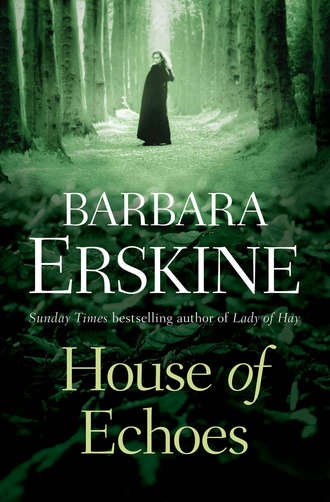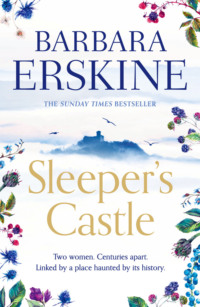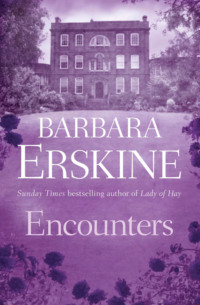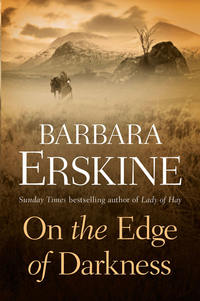
Полная версия
House of Echoes
‘He was a superstitious old buffer,’ Janet snorted fondly. ‘He used to encourage Laura to think the house was haunted. It upset her a lot. I got very cross with him.’
‘So you didn’t believe in the ghosts?’
‘No.’ The hesitation had been infinitesimal. ‘And don’t let him get to you, either, Joss. I’m sure the bishop thought he was going a bit dotty at the end and that’s why he retired him. Keep away from him, my dear.’
‘I wrote to him to say we’d inherited the house. I wanted to thank him, but he never replied.’ She had also phoned twice but there had been no answer.
‘That’s hardly surprising. He’s probably too busy having apocalyptic visions!’ Roy put in.
‘No, that’s unfair!’ Janet turned on her husband. ‘They go off to South Africa every winter since his retirement to spend several months with their daughter. That’s why he’s not been in touch, Joss.’
‘I see.’ Joss was astonished for a moment at her disappointment. She had seen Edgar as a strength, there in the background to advise them if ever they should need it. His words returned to her suddenly – words she tried to push to the back of her mind whenever she remembered them; words she had never repeated to Luke. ‘I prayed you would never come to find me, Jocelyn Grant.’
The conversation had moved on without her. Vaguely she heard Alan talking about village cricket then Sally laughing at some anecdote about a neighbour. She missed it. Edgar’s voice was still there in her ears: ‘There is too much unhappiness attached to that house. The past is the past. It should be allowed to rest.’ She shook her head abruptly. He had asked her if she had children and when she had told him, he had said nothing; and he had sighed.
Pushing her chair back with a shiver, she stood up suddenly. ‘Luke, give everyone second helpings. I’m just going to pop upstairs and make sure Tom is all right.’
The hall was silent, lit by the table lamp in the corner. She paused for a moment, shivering in the draught which swept in under the front door. The kitchen was the only room in the house they had so far managed to heat up to modern standards, thanks to the range.
She needed to think. Staring at the lamp her mind was whirling. Edgar Gower; the house; her mother’s fear; there had to be some basis for all the stories. And the devil. Why should people think the devil lived at Belheddon?
Pushing open the heavy door into the great hall she stopped in horror. Tom’s piercing screams filled the room, echoing down the stairs from his bedroom.
‘Tom!’ She took the stairs two at a time. The little boy was standing up in his cot, tears streaming down his face, his hands locked onto the bars. The room was ice cold. In the near darkness of the teddy bear night light in the corner she could see his small face beetroot red in the shadows. Swooping on him she scooped him up into her arms. His pyjamas were soaking wet.
‘Tom, what is it, darling.’ She nuzzled his hair. He was dripping with sweat.
‘Tom go home.’ His sobs were heart rending. ‘Tom go to Tom’s house.’
Joss bit her lip. ‘This is Tom’s house, darling. Tom’s new house.’ She cradled his head against her shoulder. ‘What happened? Did you have a bad dream?’
She held him away from her on her knee, studying his face. ‘Tom Tom? What is it?’
‘Tom go home.’ He was staring over her shoulder towards the window, snuffling pathetically, taking comfort from her arms.
‘I tell you what.’ She reached to turn on the main light, flooding the room with brightness. ‘Let’s change your jym-jams, and make you a nice clean, dry bed, then you can come downstairs for a few minutes to Mummy and Daddy’s party before going back to sleep. How would that be?’
Holding him on her hip she went through the familiar routine, extracting clean dry clothes and bedding from his chest of drawers, changing him, sponging his face and hands, brushing his hair with the soft baby hairbrush, aware that every few minutes he kept glancing back towards the window. His thumb had been firmly plugged into his mouth as she sat him on the rug and turned to make his bed, stripping off the wet covers, wiping over the rubber sheet.
‘Man go away.’ He took his thumb out long enough to speak and then plugged it in again.
Joss turned. ‘What man?’ Her voice was sharper than she intended, and she saw the little boy’s eyes fill with tears. Desperately he held out his arms to her. Stooping she hauled him off the ground. ‘What man, Tom Tom? Did you dream about a nasty man?’ In spite of herself she followed his gaze to the corner of the room. She had found some pretty ready-made curtains for his window. They showed clowns somersaulting through hoops and balloons and ribbons. Those and the soft colourful rugs had turned the nursery into one of the brightest rooms in the house. But in the shadows of the little night light, had there been anything there to cast a shadow and frighten him? She bit her lip.
‘Tell me about the man, Tom,’ she said gently.
‘Tin man.’ Tom reached for the locket on a chain round her neck and pulled it experimentally. She smiled, firmly extricating it from his grasp. ‘A tin man? From one of your books?’ That explained it. She sighed with relief. Lyn must have been reading him The Wizard of Oz before she left. With a glance round the room she hugged him close. ‘Come on, Tom Tom, let’s take you down to meet the neighbours.’
She knew from experience that within ten minutes, sitting on Luke’s knee in a warm kitchen, the little boy would be fast asleep and tomorrow before anything else she would buy a baby alarm so that never again would the little boy scream unheard in his distant bedroom. With a final glance round she carried him out into the darkened main bedroom. It was very cold in there. The undrawn curtains allowed frosty moonlight to spill across the floor, reflecting a soft gleam on the polished oak boards, throwing the shadow from the four-poster bed as thick bars over the rug in front of her feet. She stopped, cradling Tom’s head against her shoulder, staring suddenly into the far corner. It was deep in shadow. Her jacket, hanging from the wardrobe handle, was a wedge of blackness against the black. Her arms tightened around the little boy protectively.
Katherine
It was a whisper in the silence. Tom raised his head. ‘Daddy?’ he said. He craned round her shoulder to see.
Joss shook her head slightly. It was nothing. Her imagination. Luke was in the kitchen. ‘No, darling. There’s no one there.’ She kissed his head. ‘Daddy’s downstairs. Let’s go and find him.’
‘Tin man.’ The thumb was drawn out of the mouth long enough for Tom to point over her shoulder into the darkness of the corner. ‘Tin man there.’ His face crumpled and a small sob escaped him before he buried his face in her shoulder again.
‘No, darling. No tin man. Just shadows.’ Joss made for the door. She almost ran along the corridor and down the stairs.
‘Hey, who is this?’ Roy stood up and held out his arms to Tom. ‘How come you’ve been missing the party, old chap?’
‘Joss?’ Luke had spotted Joss’s white face. ‘What is it. What was wrong?’
She shook her head. ‘Nothing. He was crying and we didn’t hear him. I expect he had had a bad dream.’
A dream about a tin man who skulked in dark corners.
8

The drawers of the desk were full of papers and letters, the general detritus of a life time, dealt with, filed, and forgotten. Sitting on the floor with them spread out around her a couple of evenings later Joss could find nothing to explain or even relate to her mother’s mysterious notebook. She had studied it again and again. No pages had been torn out. No entries eradicated in any way. It was as if, having carefully inscribed the flyleaf for Joss, her mother had once, and once only, grabbed the empty notebook in desperation and scribbled those two lone sentences in it. They haunted Joss. They were a plea for help, a despairing scream. What had happened? Who could have upset her so much? Could it have been the Frenchman who the village thought had come to woo her?
She had said nothing to Luke about the notebook. It was as if her mother had whispered a secret to her and she did not want to betray the confidence. This was something she had to find out on her own. Putting down the notebook she reached for the coffee mug standing on the carpet next to her and sipped thoughtfully, staring out of the French doors across the lawn. There had been another heavy frost in the night and the grass was still white in the shelter of the tall hedge beyond the stables. Above it the sky was a clear brilliant blue. In the silence, through the window she could hear the clear ring of metal on metal. Luke was well into his work on the Bentley.
A robin hopped across the York stone terrace outside the window and stood head to one side staring down at the ground. Joss smiled. Earlier she had thrown out the breakfast crumbs, but there was little left now after the flock of sparrows and blackbirds had descended on them from the trees.
The house was very silent. Tom was asleep and for now at least she had the place to herself. Lightly she touched the back of the notebook with her finger. ‘Mother.’ The word hovered in the air. The room was very cold. Joss shivered. She had two thick sweaters on over her jeans and a long silk scarf wound round and round her neck against the insidious draughts which permeated the house but even so her hands were frozen. In a moment she would go back to the kitchen to warm up and replenish her coffee. In a moment. She sat still, staring round, trying to feel her mother’s presence. The room had been Laura’s special, favourite place, of that she had no doubt. Her mother’s books, her sewing, her desk, her letters – and yet nothing remained. There was no scent in the cushions, no warmth of contact as her hand brushed the place where her mother’s hand had been, no vibrations which still held the vital essence of the woman who had borne her.
The envelope with the French stamp had slipped between some old bills in a faded green cardboard wallet. Joss stared down at it for a moment, registering the slanted handwriting, the faded violet ink. The post mark, she noted was Paris and the year it was posted 1979. Inside was one flimsy sheet of paper.
‘Ma chère Laura – As you see I did not reach home yesterday as I intended. My appointment was postponed until tomorrow. I shall ring you afterwards. Take care of yourself, my dear lady. My prayers are with you.’
Joss squinted at the paper more closely. The signature was an indecipherable squiggle. Screwing up her eyes she tried to make out the first letter. P? B? Sighing, she laid the paper down. There was no address.
‘So, what are you up to?’ Luke had come into the room so quietly she had not heard him.
Startled she looked up. ‘Sorting through the desk.’
He was dressed like her in several old sweaters; over them the stained overalls and the woollen scarf did nothing to hide how cold he was. He rubbed his oily hands together. ‘Feel like some coffee? I need to thaw out.’
‘Yes please.’ She was pushing the papers together in a heap on the carpet in front of her when the telephone rang. ‘Mrs Grant?’ The voice was unfamiliar; female; elderly. ‘I understand you have been trying to reach me. My name is Mary Sutton.’
Joss felt a leap of excitement. ‘That’s right, Mrs Sutton –’
‘Miss, dear. Miss Sutton.’ The voice the other end was suddenly prim. ‘I do not answer my door to strangers, you understand. But now I know who you are you may come and see me. I have something which may interest you.’
‘Now?’ Joss was taken aback.
‘That’s right. It is here, now.’
‘Right. I’ll come over now.’ Joss shrugged as she hung up. ‘A somewhat peremptory Miss Sutton wishes to see me now. I’ll take a rain check on the coffee, Luke, and go before she changes her mind. She says she has something for me. Will you watch Tom Tom?’
‘OK.’ Luke leaned across and kissed her cheek. ‘See you later then.’
This time when Joss knocked at the cottage door on the green it opened almost immediately. Mary Sutton was a small wizened woman with wispy white hair, caught back in a knot on the top of her head. Her narrow, birdlike face was framed by heavy tortoiseshell spectacles.
Joss was shown into a small neat front room which smelled strongly of old baking and long dead flowers. A heavy brown oil cloth covered the table on which was a small notebook. It was identical to the one Joss had found in her mother’s desk. Her eyes were glued to it as she took the proffered seat on an upright chair near the window.
After several long seconds of silent scrutiny the solemn face before her broke suddenly into a huge beam. ‘You may call me Mary, my dear, as your mother did.’ Mary turned away and began to pour out tea which had been laid ready on a tray on the sideboard. ‘I looked after you when you were very small. It was I who gave you to the adoption people when they came to collect you.’ She blinked hard through her pebble lenses. ‘Your mother could not bring herself to be there. She walked in the fields down by the river until you had gone.’
Joss stared at her aghast, trapped into silence by the lump in her throat. Behind the glasses the old lady’s eyes, magnified into huge half globes, were brimming with tears.
‘Why did she give me away?’ It was several minutes before Joss could bring herself to ask. She accepted the tea cup with shaking hands and put it down hastily on the edge of the table. Her eyes had returned from Mary’s face to the notebook.
‘It was not because she didn’t love you, my dear. On the contrary, she did it because she loved you so much.’ Mary sat down and pulled her skirt tightly over her knees, tucking the voluminous fabric under her bony legs. ‘The others had died, you see. She thought if you stayed at Belheddon, you would die too.’
‘The others?’ Joss’s mouth was dry.
‘Sammy and George. Your brothers.’
‘Sammy?’ Joss stared at her. She had gone cold all over.
‘What dear?’ Mary frowned. ‘What did you say?’
‘You looked after them? My brothers?’ Joss whispered.
Mary nodded. ‘Since they were born.’ She gave a wistful little smile. ‘Little rascals they were, both of them. So like their father. Your mother adored them. It nearly broke her when she lost them. First Sammy, then Georgie. It was too much for any woman to bear.’
‘How old were they when they died?’ Joss’s fingers were clenched in her lap.
‘Sammy was seven, near as makes no difference. Georgie was born a year after that, in 1954, and he died on his eighth birthday, bless him.’
‘How?’ Joss’s whisper was almost inaudible.
‘Terrible. Both of them. Sammy had been collecting tadpoles. They found him in the lake.’ There was a long silence. ‘When Georgie died it was nearly the end of your mother.’
Joss stared at her speechlessly as, shaking her head, Mary sipped at her tea. ‘They found him at the bottom of the cellar steps, you see. He knew he was never allowed down there, and Mr Philip, he had the cellar keys. They were still there, locked in his desk.’ She sighed. ‘Sorrows long gone, my dear. You must not grieve over them. Your mother would not have wanted that.’ She reached for the notebook and took it off the table, holding it on her lap with little gentle stroking movements of her fingers. ‘I’ve kept this all these years. It’s right you should have them. Your mother’s poems.’ Still she didn’t release the volume, holding it close as if she could not bear to part with it.
‘You must have loved her very much,’ Joss said at last. She found there were tears in her eyes.
Mary made no response, continuing to stroke the notebook quietly.
‘Did you – did you know the French gentleman who came here?’ She studied the old lady’s face. There was a slight pursing of the lips, no more.
‘I knew him.’
‘What was he like?’
‘Your mother was fond of him.’
‘I don’t even know his name.’
Mary looked up at last. This at least was something she seemed able to divulge without reservation. ‘Paul Deauville. He was an art dealer. He travelled the world I understand.’
‘Did he live in Paris?’
‘He did.’
‘And my mother went to live with him?’
A definite frisson – almost a shudder. ‘He took your mother away from Belheddon.’
‘Do you think he made her happy?’
Mary met Joss’s eye and held it steady through the grotesquely magnifying lenses of her glasses. ‘I hope so, my dear. I never heard from her again after she left.’
As if she were afraid she had said too much Mary clamped her lips shut, and after several more perfunctory attempts at questioning her Joss rose to leave. It was only as she turned to walk through the front door into the blinding frosty sunlight that Mary at last relinquished the notebook.
‘Take care of it. There is so little of her left.’ The old lady caught her arm.
‘I will.’ Joss hesitated. ‘Mary, will you come and see us? I should like you to meet my little boy, Tom.’
‘No.’ Mary shook her head. ‘No, my dear. I’ll not come to the house if you don’t mind. Best not.’ With that she stepped back into the shadows of her narrow front hall and closed the door almost in Joss’s face.
The graves were there, beyond her father’s. Quite overgrown now, she hadn’t seen the two small white cross headstones side by side in the nettles under the tree. She stood looking down at them for a long time. Samuel John and George Philip. Someone had left a small bowl of white chrysanthemums on each. Joss smiled through her tears. Mary at least had never forgotten them.
Luke and Tom were busy in the coach house when she got home. With one look at their happy oily faces she left them to their mechanical endeavours and clutching the notebook retreated to the study. The sunshine through the window had warmed the room, and she smiled a little to herself as she stooped and throwing on some logs, coaxed the fire back into life. In a few moments it would be almost bearable. Curling up on the arm chair in the corner she opened the notebook at the first page. Laura Manners – Commonplace Book. The inscription in the flyleaf of this notebook was in the same flamboyant hand as that in the other. She glanced at the first few pages and felt a sharp pang of disappointment. She had assumed her mother would have written the poems herself, but these were bits and pieces copied out from many authors – a collection obviously of her favourite poems and pieces of prose. There was Keats’s ode To Autumn, a couple of Shakespeare sonnets, some Byron, Gray’s Elegy.
Slowly, page after page she leafed through, reading a few lines here and there, trying to form a picture of her mother’s taste and education from the words on the page. Romantic; eclectic, occasionally obscure. There were lines from Racine and Dante in the original French and Italian, a small verse from Schiller. She was something of a linguist then. There were even Latin epigrams. Then suddenly the mood of the book changed. Stuck between two pages was a single sheet, old and torn, very frail, held in place by tape which had discoloured badly. It was an India paper page, torn, Joss guessed from a Roman Missal. On it, in English and in Latin, was a prayer for the blessing of Holy Water.
… I do this that the evil spirit may be driven away from thee, and that thou mayest banish the enemy’s power entirely, uprooting and casting out the enemy himself with all his rebel angels …
… so that whatsoever in the homes of the faithful or elsewhere shall have been sprinkled with it may be delivered from everything unclean and hurtful. Let no breath of contagion hover there, no taint of corruption. May all the wiles of the lurking enemy come to nothing, and may anything that threatens the safety or peace of those who dwell there be put to flight by the sprinkling of this water …
Joss stared round, letting the book fall into her lap, realising she had been reading the words out loud. The house was very silent.
Exorcizo te, in nomine Dei† Patris omnipotentis, et in nomine Jesu† Christi Filii ejus, Domine nostri, et in virtute Spiritus† Sancti …
The devil himself lives here …
Alan Fairchild’s words echoed through her head.
For several minutes she sat staring into space then, closing the notebook she stood up and going to the desk, she reached for the phone.
David Tregarron was in the staff room marking test papers when her call was put through.
‘So, how is life in the outback, Jocelyn?’ His booming voice seemed to echo round the room.
‘Quite a strain actually.’ She frowned. The words had come spontaneously, accurately, instead of the easier platitude she had framed in her head. ‘I hope you can come and see us soon.’ She sounded so much more desperate than she had intended. ‘David, would you do me a favour? When you are next in the British Library reading room would you look up Belheddon for me and see if you can find anything about its history?’
There was a slight pause as he tried to interpret her tone. ‘Of course I will. From what you said before it sounds like a wonderful old place. I’m looking forward to my first visit.’
‘So am I.’ She heard the fervour in her voice with surprise. ‘I’d like to know what the name means.’
‘Belheddon? That sounds fairly straightforward. Bel – beautiful, of course, or if the name is much older it might come from a Celtic derivation, like the Irish, which if I remember it rightly, has much the same meaning as Aber in Wales or Scotland – the mouth of a river. Or it could come from the old gods Bel, you remember Beltane, or Baal from the Bible who came to represent the devil himself. Then I think heddon means heather – or a temple on a heathery hill or some such –’
‘What did you say?’ Joss’s voice was sharp.
‘A temple –’
‘No, before that. About the devil.’
‘Well, it’s just a possibility I suppose. Rather romantic really. Perhaps the original site housed a temple.’
‘There’s a local legend, David, that the devil lives here.’ Her voice was strangely thin and harsh.
‘And you sound afraid rather than amused. Oh, come on Joss. You’re not letting the credulous yokels get to you, are you?’ The jovial manner had dropped away abruptly. ‘You don’t believe in any of this, surely?’
‘Of course not.’ She laughed. ‘I’d just like to know why the house has this reputation. It is a bit sort of dramatic!’
‘Well, I suppose it is on dark nights with the wind howling round. I must say, I can’t wait to come and see it.’ There was a pause. ‘I don’t suppose I could look in this weekend, could I? I know it’s getting awfully near Christmas but term’s practically over. I can look a few things up for you; find a few books, perhaps?’
She laughed, extraordinarily pleased. ‘Of course you can come! That would be wonderful. One thing we are not short of is space, providing you pack enough warm clothes. It’s like the Arctic here.’
When Luke came in, carrying a filthy small boy, both of them cold and terribly pleased with themselves Joss was smiling to herself as she stirred a huge pan of soup. ‘David’s coming up the day after tomorrow.’
‘Great.’ Luke held Tom under one arm over the sink and reached for the Swarfega. ‘It will be nice to see him. He’ll bring news no doubt of dear old London and civilisation.’ He chuckled, smearing green goo all over his small son’s hands as Tom crowed with delight. Luke glanced at her over the sticky curls. ‘He’s not going to make you feel you’re missing out, is he? Rural stagnation instead of academia.’
She shook her head. ‘Nope. If I want to get back into it, I can always start some kind of research project with the prospect of a book in about a thousand years’ time. Or something less academic and more lucrative. The book David suggested I have a go at, perhaps. I might just have a chat to him about that.’ The idea had in fact been growing on her.








